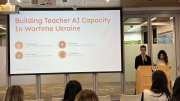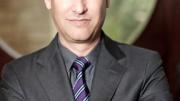The Harvard General Counsel’s office, charged last September by President Lawrence S. Bacow to investigate Jeffrey Epstein’s gifts to and relationship with the University, found that his financial support did not extend past his conviction on sex charges involving a minor in 2008—but that his earlier access to the institution was deeper than had been known, and remained extensive, in troubling ways, through 2018. Epstein died in jail last August, reportedly by suicide, while facing numerous new charges of sex trafficking of minors. The report, conveyed to Bacow and released with his comments on May 1, revealed:
Epstein made gifts totaling $9.1 million between 1998 and 2008—in line with the figure released last autumn, with the largest sum directed to the Program for Evolutionary Dynamics (PED; $6.5 million), run by professor of mathematics and of biology Martin Nowak.
President Drew Gilpin Faust, in 2008, and Faculty of Arts and Sciences (FAS) dean Michael D. Smith, in 2013, decided, independently, not to accept further gifts from Epstein—the latter when faculty members advocated accepting further funding for the PED and the mathematics department.
In 2005, however, Epstein had received an appointment as a visiting fellow (subsequently renewed) with support from then-psychology department chair Stephen Kosslyn (who had received $200,000 of research support from Epstein; he left Harvard’s faculty in 2011). The general counsel’s report concluded that he “lacked the academic qualifications visiting fellows typically possess and his application proposed a course of study Epstein was unqualified to pursue.”
Furthermore, Epstein visited the PED offices more than 40 times between 2010 and 2018—well after his conviction. Although he apparently did not engage with undergraduates, he did use the visits to network with faculty members. “While inviting Epstein to campus did not violate any Harvard policies,” the report continues, “aspects of his relationship to the PED, such as his access to the program’s offices, treatment on the PED’s website” (at Epstein’s request, and “part of a larger effort to rehabilitate his image”), and interactions concerning a grant application, “do implicate Harvard policies and our findings and recommendations address these issues.” (The website page remained until “In October 2014, sexual assault survivor advocates contacted both PED and President Faust’s office about Epstein’s page….In response, PED took the page down.”) In response to the documentation of these visits, among other matters, FAS dean Claudine Gay announced that Nowak has been placed on paid administrative leave pending a review of possible violations of FAS policies and standards of professional conduct.
In the report, vice president and general counsel Diane Lopez made recommendations pertaining to school-based and central fundraising offices and the communications among them; criteria for evaluating gifts and donors, and their dissemination; FAS criteria for appointing visiting fellows; and the need for the further investigation Gay has now initiated. Bacow directed that the recommendations be implemented “as soon as possible,” and noted further that the $201,000 in gifts from Epstein that remained unspent have been split between two organizations that support victims of human trafficking and sexual assault. Correcting University shortcomings, he said, both benefits the institution and serves to recognize “the courageous individuals who sought to bring Epstein to justice.”
For a complete report, with the messages from Bacow, Lopez, and Gay, and a link to the general counsel’s full findings, see harvardmag.com/epstein-report -20.








